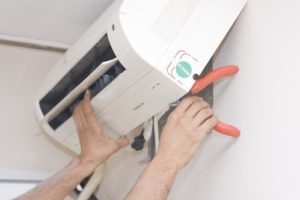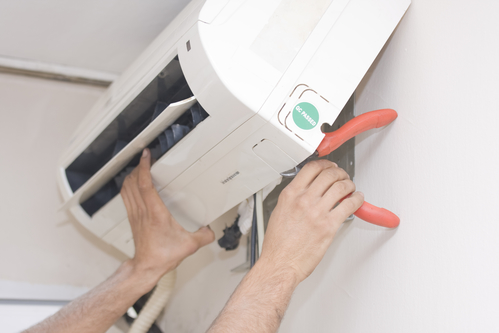If you own an air conditioner, you probably spend periods of warm weather in a state of bliss. However, that state can occasionally be interrupted by periods of worry. Most of this anxiety is the cause of owners feeling as though they do not know enough about their air conditioners or how they operate. The less you know about your air conditioner, the more confused you can find yourself if something out of the ordinary occurs. For example, many air conditioner owners are puzzled when they notice water near their indoor units. Could the air conditioner be leaking water, and if so, then why?
 As luck would have it, we can offer some guidance on the subject. We serve air conditioner owners throughout Santa Rosa and the surrounding regions, so we have become quite familiar with the causes of leaking water. Below are some of the most likely explanations for why water is forming near your air conditioner, and some ideas for what can be done to solve the problem if it does turn out to be a leak.
As luck would have it, we can offer some guidance on the subject. We serve air conditioner owners throughout Santa Rosa and the surrounding regions, so we have become quite familiar with the causes of leaking water. Below are some of the most likely explanations for why water is forming near your air conditioner, and some ideas for what can be done to solve the problem if it does turn out to be a leak.
Is the Air Conditioner Leaking Water, or Is It Just a Puddle? Learn the Difference
One of the first things you should know is that water near your indoor unit does not necessarily indicate a leaking air conditioner. In fact, several factors may cause water to pool near your unit, and a leaky air conditioner is only one of them. Learning to tell the difference between an air conditioner that is leaking water and one that is producing moisture for a perfectly normal reason can save you the costs of an unnecessary service call. Of course, you should still have your home visited by a service technician at least once a year to clean your ducts, diagnose issues, and prevent emergencies.
Small Amounts of Water are Normal in Certain Places
If you only notice a small amount of water in the area near your condensate drain pipe, do not be alarmed. On unusually hot or humid days, your air conditioner must work hard to cool your space. In such cases, condensation is produced, and some of it may drip on the floor. However, substantial amounts of water should be treated as a cause for concern and dealt with as soon as possible.
Three Common Types of Leaks
There are three common reasons why an air conditioner might be leaking water. Copious amounts of water forming near your indoor unit may be attributed to any of the following:
A) A blocked condensate drain line.
In many cases, leaks are merely the result of a blockage that prevents water from moving through your condensate drain line and out of the unit efficiently. If this occurs, water will back up in your drain pan and eventually overflow. Whether you need professional help to deal with a blocked drain line or not, will depend on where exactly the blockage occurs. You can often remove an obstruction near the opening of the drain line yourself, but blockages further in require special vacuums and other equipment more common to HVAC technicians.
B) A cracked condensate drain pan.
Cracks in your condensate drain pan prevent it from being able to hold the water that naturally develops as your air conditioner is running, and which is usually taken away through the condensate drain line. Even if your drain line has no blockages, a cracked pan can cause leaking. Instead of overflowing, it allows water to spill through the crack and onto the floor. If you have checked your line already, try replacing your drain pan and see if the problem stops.
C) Dirty air filters cutting off circulation to the evaporator coil.
One of the other common causes of air conditioner leakage is also one of the easiest to fix—provided you deal with it quickly. Dirty filters are easy enough to change without help, but many people neglect them until they cause more significant expensive problems. For example, a dirty filter can prevent air from reaching your evaporator coil until it reaches the point where the coil freezes. Once that happens, the melting ice can cause excess water to enter your drain pan and make it overflow. If you neglect to change the filters quickly, your evaporator coil may break down entirely and need replacement.
If the leak persists after you have checked your drain line for clogs, replaced your pan, and changed your filters, you will require a professional to diagnose and solve the problem. Contact a licensed pro who can solve the problem efficiently. Just make sure that you try all these strategies first so that you don’t end up paying for a service call you don’t need. Your air conditioner may be leaking water for many reasons, but not all of them are cause for alarm. Take a careful and methodical approach, so that you can be confident that you are calling your technician for a good reason. For more information on our AC Service plan, please call us on 707-800-6287

